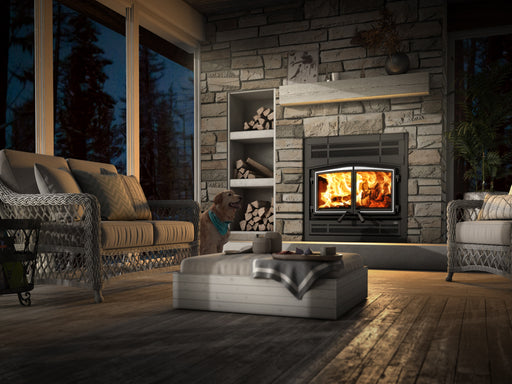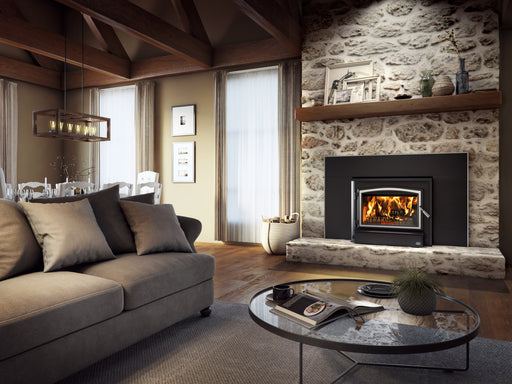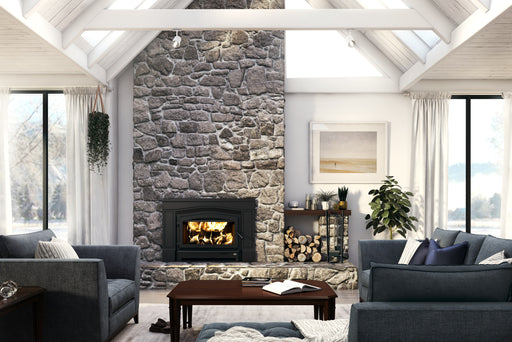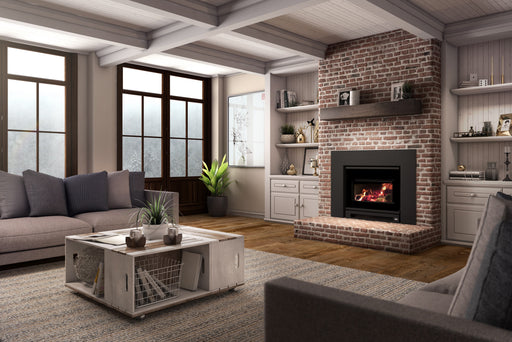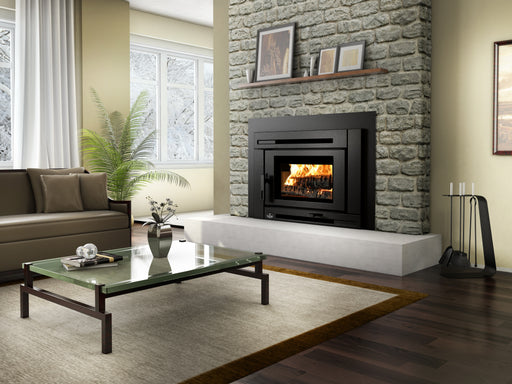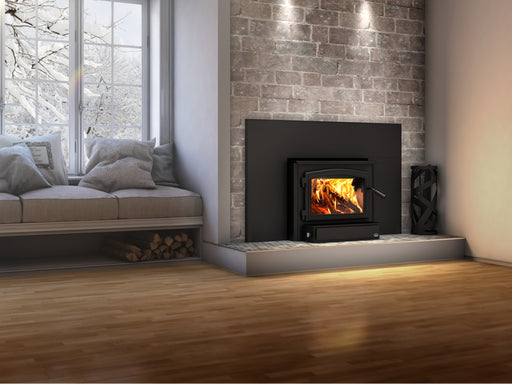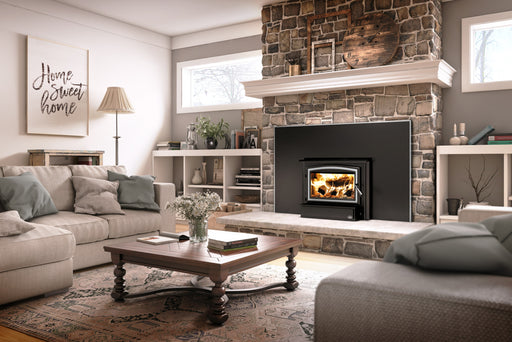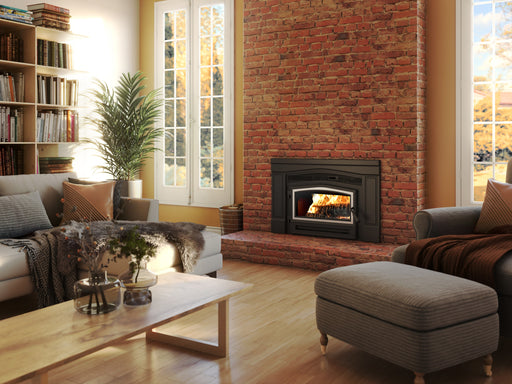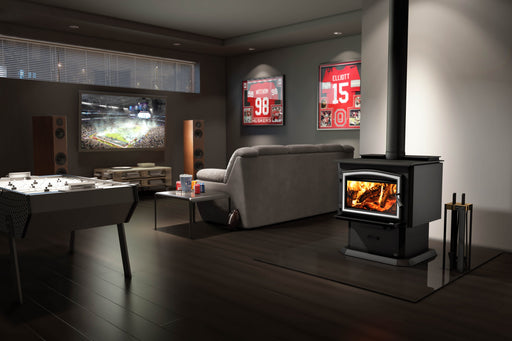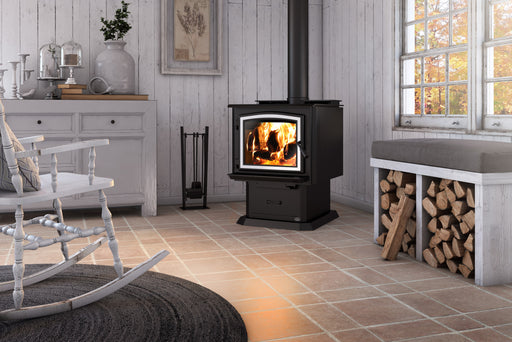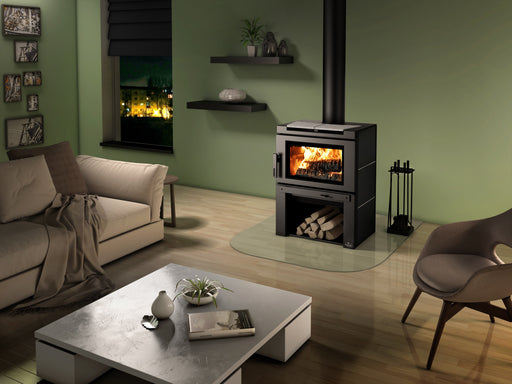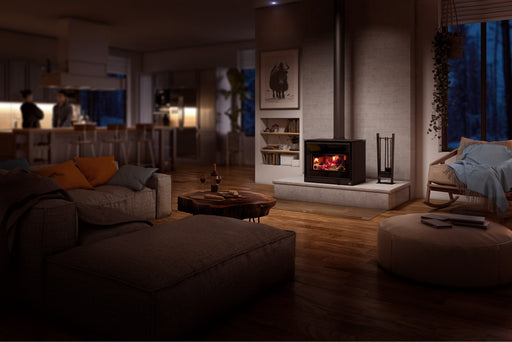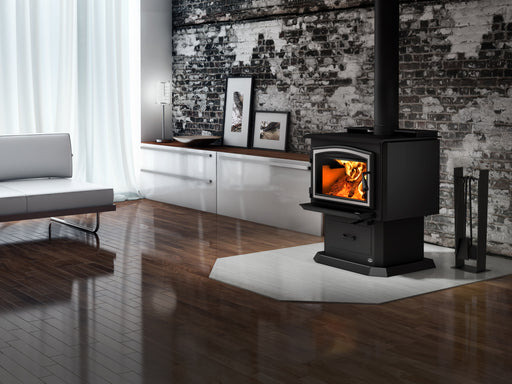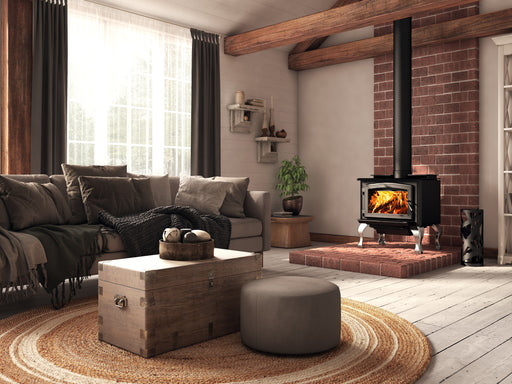Osburn Fireplaces
EPA STANDARD: EVERYTHING YOU NEED TO KNOW
WHAT IS THE EPA STANDARD?
EPA is the US agency responsible for setting environmental standards for the United States, namely fine particle emissions from wood-burning appliances. In May 2015, the standard was set at 4.5 g/h or less of fine particle emissions. The US agency has reviewed the existing standard and revised it downward. As of May 2020, wood-burning appliances must have an emission rate of 2.5 g/h or less in order to be sold in the United States. This rate is set at 2.0 g/h for pellet appliances. It is important to mention that EPA certified appliances emit up to 90% less particulate matter in the atmosphere than conventional stoves.
WHAT IS THE CANADIAN EMISSIONS STANDARD?
In Canada, the CSA B415.1-10 standard regulates fine particle emissions. Canadian provinces accept CSA B415.1-10 and EPA certified appliances. Under CSA B415.1-10, appliances must have emissions below 4.5 g/h. Obsurn appliances that do not meet the EPA 2020 standard are tested to CSA B415.1-10 and their emissions do not exceed 4.5 g/h. They can therefore be sold legally anywhere in Canada. Exceptions may apply, as is the case for the city of Montreal, where emissions must be less than 2.5 g/h (regardless of EPA or CSA certification). If in doubt, check if your municipality has a specific by-law relating to wood heating.
DO I HAVE TO CHANGE MY APPLIANCE?
Everywhere in the United States and Canada, except for Nunavut, EPA or CSA B415.1-10 certified appliances are mandatory. Exceptions exist, namely for decorative wood burning fireplaces, wood cook stoves or camp stoves. Each municipality may require that the appliances installed on its territory meet more stringent standards as is the case for the city of Montreal, even if the province does not require it. It is therefore important to refer to your municipality for the current regulation, as well as to check whether a subsidy program for the replacement of old appliances is available to citizens.
In almost 100% of cases, municipalities do not require the replacement of existing appliances, but require that all new installations comply with the new regulations. There are exceptions, however, including the city of Montreal, where this acquired right is not applicable. After first announcing a complete ban on wood burning appliances, the city retracted and finally established a regulation in October 2018, which stipulates that all wood burning appliances used on its territory must emit 2.5 g/h or less when tested to EPA or CSA B415.1-10. Therefore, existing appliances on the territory of the city of Montreal that emit more than 2.5 g/h must be replaced or condemned.
HOW MUCH G/H DOES MY APPLIANCE EMIT?
If you already own a wood-burning appliance and wish to verify the number of g/h it emits, refer to your appliance’s certification label. It is located at the back of the appliance in the case of a freestanding stove, or on the side of the appliance behind the unit’s faceplate in the case of an insert. If the appliance’s emissions do not appear on the unit’s certification label (as it is often the case), you can also look at the owner's manual (available in the Manuals directory) or directly in the product page of our website if it is a recent appliance.
THE STANDARD AT OSBURN
Our engineering team is working hard to offer you high-performance products that are also environmentally friendly. All Osburn appliances are:
- Tested with cordwood. Since the daily use of wood burning appliances is done with this type of fuel, it is the most representative test method of the actual performance of the appliances. Incidentally, the EPA recommends that manufacturers use this type of fuel to perform certification tests.
- Non-catalytic. Unlike catalytic appliances, non-catalytic stoves, inserts and fireplaces require much less frequent and expensive maintenance. Reducing emissions of non-catalytic appliances requires a more efficient combustion, not the addition of a catalyst.
- Independently tested by an accredited laboratory under EPA - New Source Performance Standards (NSPS), and/or CSA B415.1-10. You are therefore assured that the results obtained are credible, verifiable and repeatable.
Osburn 2500 Pellet Stove - OP00025
Osburn 2500 EPA Pellet Stove - OP00025 The new Osburn 2500 pellet stove is an entry-level appliance, roughly comparable to the 3000 model, wh...
View full detailsOsburn Horizon Wood Fireplace - OB04010
Beyond the Size!This wood fireplace offers peace of mind due to the combination of energy efficiency and clean heating. A simple solution; it...
View full detailsOsburn Everest II Wood Fireplace - OB04016
Osburn Everest II Wood Fireplace - OB04016 Attractive, efficient and particularly ecological, the all-new Everest II is the ultimate addition...
View full detailsOsburn Stratford II Wood Fireplace - OB04007
Osburn Stratford II Wood Fireplace - OB04007 Let yourself be charmed by the timeless beauty of this non-catalytic wood fireplace, which perfor...
View full detailsOsburn 3500 Wood Insert With Blower - OB03510
Osburn 3500 Wood Insert With Blower - OB03510 The Osburn 3500 wood insert combines power, efficiency and safety. With its amazing features and sob...
View full detailsOsburn Matrix 2700 Wood Insert with Blower - OB02700
Osburn Matrix 2700 Wood Insert with Blower - OB02700 Inspired by nature, the Matrix 2700 insert is a fusion of traditional style and tech...
View full detailsOsburn Inspire 2000 Wood Insert - OB02045
Osburn Inspire 2000 Wood Insert - OB02045 This wood insert will bring an unmatched modernism to your decor, in addition to perfectly combining...
View full detailsOsburn Matrix Wood Insert w/ Blower - OB02028
Osburn Matrix Wood Insert w/ Blower - OB02028Please call us at 1-888-418-0005 for any offers currently running!This updated version of the Matrix ...
View full detailsOsburn 2000 Wood Insert with Blower - OB02016
Osburn 2000 Wood Insert with Blower - OB02016 The new standard lowering the fine particulate emission threshold will be conquered by the recent ce...
View full detailsOsburn 1700 Wood Insert - OB01705
Osburn 1700 Wood Insert - OB01705 Like its larger counterpart Osburn 2000, the 1700 insert offers a revamped version of perfect size to provide am...
View full detailsOsburn Matrix 1900 Wood Insert - OB01900
Osburn Matrix 1900 Wood Insert - OB01900 One of the most elusive Osburn product offerings... We don't have much information on this unique wood ...
View full detailsOsburn 950 Wood Stove - OB00950
Osburn 950 Wood Stove - OB00950 Would you like to add a dose of warmth and cozyness to your home? Bring comfort and functionality to your daily li...
View full detailsOsburn 3500 Wood Stove With Blower - OB03500
Osburn 3500 Wood Stove With Blower - OB03500 Specifically designed to face the rigor of winter, the Osburn 3500 is an essential for any spacious h...
View full detailsOsburn 3300 Wood Stove - OB03300
Osburn 3300 Wood Stove - OB03300 The Osburn 3300 represents the essence of eco-friendly and efficient heating. With an emission rate of 0.95 g/h, ...
View full detailsOsburn Matrix Wood Stove With Blower - OB02032
Osburn Matrix Wood Stove With Blower - OB02032 With the same sleek, modern style and vastly improved performance, the Matrix wood burning stove wi...
View full detailsOsburn Inspire 2000 Wood Stove - OB02042
Osburn Inspire 2000 Wood Stove - OB02042 Are you interested in getting off the beaten path? The Inspire offers a style that will surely withstand v...
View full detailsOsburn 2000 Wood Stove with Blower - OB02015
Osburn 2000 Wood Stove with Blower - OB02015 Year after year, the 2000 model remains one of the most popular wood stoves in the Osburn range. In 20...
View full detailsOsburn 1700 Wood Stove - OB01700
Osburn 1700 Wood Stove - OB01700 Designed to meet the needs of smaller spaces, the Osburn 1700 combines robustness and elegance to allow you to en...
View full detailsWe only offer Free Shipping within the Continental USA

Dear Valued Customer,
We are pleased to offer free shipping within the Continental USA from our headquarters in South Carolina. However, please note that additional shipping fees may apply for deliveries to the Midwest or West Coast.
If you have any questions or special requests, feel free to contact us via email at Inquiry@Marvellesures.com. We recognize that written communication can be especially convenient, and our team is dedicated to responding to your inquiries promptly.
To help us assist you more effectively, kindly include a brief description of the item you’re interested in or any specific details you’d like to inquire about. We are always happy to provide the information you need and ensure your experience with us is exceptional.
Best regards,
The Marvellesures Customer Support Team






